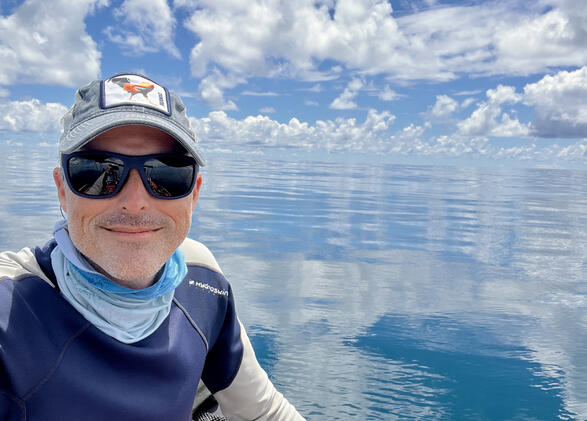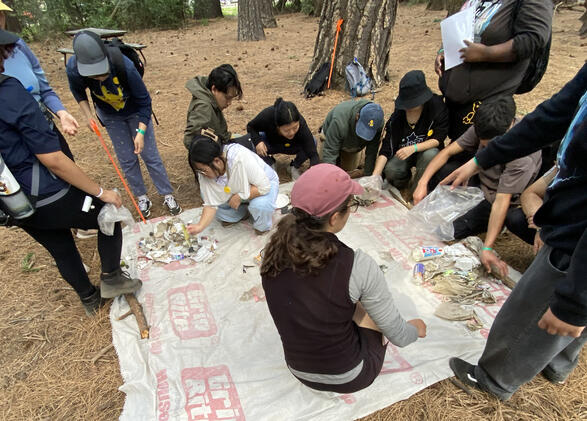Student to Steward: Marisa Granados’s Unstoppable Trajectory

Marisa Granados stares into a glowing bonfire crackling with cedar branches. It's the last night of her NatureBridge experience in Olympic National Park, and she is bawling her eyes out in front of her classmates and NatureBridge educator. The evening is emotional for everyone who has come to love the park and the program, but Marisa’s connection seems even deeper.
After sharing her experiences and what she’d forever remember from the last week, Marisa walks past the dancing flames to her educator, Dee (Deanna Butcher).
Between tears, she says, “Dee, I promise that I'm going to come back here and work with you someday.”
Less than a year later after that bonfire in her junior year, Marisa was honored as NatureBridge’s Student of the Year in 2018. We’ve interviewed her on two prior occasions because of her passion, commitment and insights. Each time, she brings a new perspective as to what it’s like to take the next steps as an environmental steward after taking part in a high school NatureBridge program.
We last spoke with her six months prior to the onset of COVID-19 in the U.S. At the time, a day in the life of Marisa Granados sounded as wildly busy as it did impressive: she was the resident assistant of a dorm, honors student, weekend snowboarder, NOLS Wilderness First Responder, blog writer, an involved fellow with Our Climate Voices and she even logged hours in pursuit of her private pilot license. Before she’d even graduated high school, she developed an environmental stewardship handbook for middle school students in concert with the U.S. Forest Service. She founded Earth Guardians Albuquerque and The Planet Justice Project in 2018 and once called herself, “unstoppable” in her purpose-driven quest to be “an ally for the environment and future generations.”
All this before she was 20 years old.
In the subsequent years since we last spoke, Marisa has drawn closer to obtaining her degree in Ecosystem Science and Sustainability, and has faced the same challenges that many students have due to the pandemic — isolation, a virtual learning environment, increased academic pressure.
“At the beginning of college, I was doing so much advocacy. I wrote a weekly blog, took part in a storytelling fellowship, led Earth Guardians and I’m sure a lot more,” she says. “And honestly, I got really burnt out. I got burnt out and depressed about the state of our climate and people’s unwillingness to engage in this super important conversation.”
Climate anxiety and burnout among climate scientists is a documented phenomenon; it’s unsurprising that someone as passionate as Marisa, with her deeply felt convictions and personal connection to nature, would feel its impact. But instead of throwing up her hands in exasperation and leaving the environmental science field to use her talents elsewhere, she stepped back to refocus and recalibrate.
"I listened to myself; listened to my body. I wanted to focus on smaller scale things and rebuild in a way that takes care of myself, so that when I have my degree, I can be very involved.”
Marisa’s field of study not only contains a risk of emotional burnout and anxiety, but its curriculum is also best administered with field work, lab days and hands-on science. Colorado State University, like many colleges, canceled in-person classes for part of the pandemic in 2020 and 2021. This left Marisa and many other students with online “laboratories” and self-starter research to conduct in their backyards or public parks, instead of field excursions with classmates and a professor.
“It was sad,” Marisa says. “It definitely wasn’t as in-depth as it would’ve been in person. Plus not being able to meet new people was difficult.”
Thankfully, the return of in-person classes at Colorado State last year brought back field days, lab experiments and the ability to dive deep into the topics that fascinated Marisa and her classmates.
“It’s funny — you don’t realize how much you miss something until you get it back,” she says.
I listened to myself; listened to my body. I wanted to focus on smaller scale things and rebuild in a way that takes care of myself, so that when I have my degree, I can be very involved.Marisa Granados
Despite the challenges of being on campus during a pandemic (fear of contracting COVID-19, masks making social connection difficult, etc.), Marisa found learning in-person to be critical for her education and she relished being back.
“Last semester I took a class on dendrology (the study of woody plants and their taxonomic categories) and an integrated tree health management class. So that's all tree diseases — pests and pathogens and abiotic factors and stuff like that,” Marisa says.
“And in those classes, I was actually able to go out into the field a little bit. We took a full-day field trip to Rocky Mountain National Park and observed different plant pathogens and how they actually affected plants in the park. It was so cool to see the application of what we were learning in the classroom.”
Marisa didn’t start out as a middle school dendrology fanatic. Prior to her NatureBridge experience in 11th grade, she was set to study architecture.
“Then I came to Olympic in spring of my junior year with NatureBridge and it was life-changing,” she says. “First of all, coming from New Mexico, it just looked like another planet. So many shades of green, it was insane. Like a movie.”
She was inspired by the place as well as the instruction. Marisa still keeps in touch with the educator who led her junior year program — the one from the bonfire.
“Dee is a really incredible educator and communicator. Very effective in the messages that she was teaching us in terms of connecting with the environment, connecting it back to the sense of place and the science, and also helping us feel empowered to protect an ecosystem like Olympic.”
Her school didn’t offer a subsidized senior trip like it did for Marisa in her junior year, but she couldn’t stay away from the Pacific Northwest. When she saw an option for a two-week backpacking expedition with NatureBridge into Olympic National Park, she pounced on the opportunity.
“I chose to pay and go anyway. I wanted to go back. I needed to go back.”
The two NatureBridge excursions taken as a whole inspired Marisa to pivot to environmental science as a field of study. She’s even writing her collegiate honors thesis on best practices for teaching sustainability concepts and developing those core competencies within undergraduate students. It’s hard to imagine a study more directly related to or inspired by NatureBridge.
Dee is a really incredible educator and communicator. Very effective in the messages that she was teaching us in terms of connecting with the environment, connecting it back to the sense of place and the science, and also helping us feel empowered to protect an ecosystem like Olympic.Marisa
Deanne Butcher (Dee) has moved on to become the Youth Programs Coordinator at the Wenatchee River Institute, so while Marisa may not get to exactly work with her at NatureBridge, the spirit of what she said to Dee around the bonfire five years ago is undeniably true.
With her degree and diploma just around the corner and the overwhelming challenges of COVID mostly behind her, Marisa is looking forward to some much deserved rest. The rigors of the pandemic and being a high-achieving science student have her dreaming about a summer adventure.
One guess as to where she’ll be going.
“I cannot wait to go back to Olympic. I’m going to make it happen this summer because it's kind of a reset point for me. I think I need that after I graduate from college,” she laughs.
Sometimes, you have to pause to be truly unstoppable.


